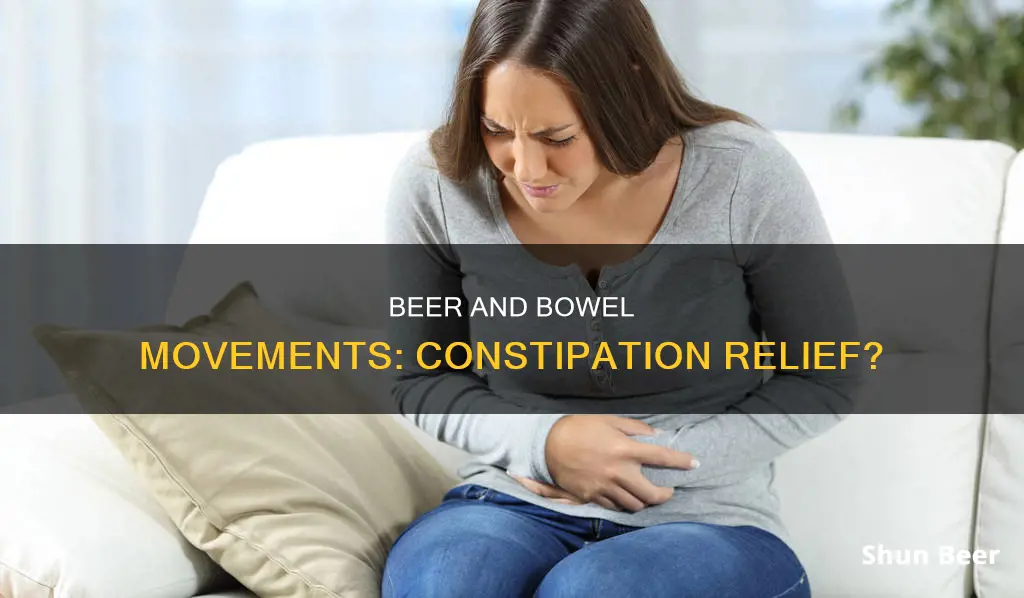
Alcohol can have varying effects on bowel movements, and beer is no exception. Beer contains beta-glucans, a soluble fibre that acts as a natural laxative, which can help relieve constipation. However, alcohol is also a diuretic, which causes the body to produce more urine than usual, leading to dehydration, a common cause of constipation. Additionally, alcohol can irritate the gut and intestinal lining, causing inflammation and affecting the body's ability to absorb water and nutrients. Therefore, while beer may provide some relief from constipation due to its fibre content, excessive consumption can lead to dehydration and gut irritation, potentially exacerbating constipation.
| Characteristics | Values |
|---|---|
| Alcohol content | Beer typically contains 5% alcohol, wine 12%, and liquor 40% |
| Effect on constipation | Alcohol can cause and relieve constipation, depending on the person and how much they drink |
| Diuretic effect | Alcohol is a diuretic, causing increased urine production and potential dehydration, which can lead to constipation |
| Intestinal irritation | Alcohol irritates the intestinal lining, affecting the absorption of nutrients and water, which can result in constipation |
| Bowel movement impact | Alcohol can speed up or slow down bowel movements, leading to diarrhea or constipation |
| Preventative measures | Drinking in moderation, staying hydrated, and eating before drinking alcohol can help prevent constipation |
| Beer benefits | Beer contains fiber, silicon, antioxidants, and B-vitamins, offering potential health benefits |
What You'll Learn

Beer contains fibre, acting as a natural laxative
Beer contains fibre, which may help relieve constipation. Beer is made from barley, which contains beta-glucans, a type of soluble fibre that acts as a natural laxative. This fibre is also associated with a reduced risk of disease. In addition, beer has a higher fibre content than wine, with lager containing 0.75 grams of fibre per bottle and dark beer containing 1.3 grams.
Fibre is essential for digestive health, as it helps to add bulk to stools and promotes regularity. It is recommended that adults consume 25-30 grams of fibre per day. However, it is important to note that excessive alcohol consumption can lead to dehydration, which is a common cause of constipation. Therefore, it is crucial to drink in moderation and ensure adequate hydration by consuming water or other non-alcoholic beverages.
While beer may provide some fibre, there are other foods that are much richer sources of this nutrient. For example, legumes, such as pinto beans, are excellent sources of fibre that can help promote digestive health and relieve constipation. Additionally, eating a balanced meal with fibre-filled foods before drinking alcohol can help reduce irritation in the intestines.
It is worth noting that the effects of alcohol on bowel movements can vary from person to person. While some people may find that beer helps relieve constipation, others may experience the opposite effect. Alcohol can irritate the gut and speed up the digestive system, leading to either diarrhoea or constipation. Therefore, it is important to pay attention to how your body responds to different types and amounts of alcohol and adjust your consumption accordingly.
Orthodox Christians: Beer During Fasting, Allowed or Not?
You may want to see also

Beer can cause dehydration, leading to constipation
Beer can cause dehydration, which can lead to constipation. Dehydration is one of the main causes of constipation. Alcohol consumption can cause dehydration because it inhibits the release of the antidiuretic hormone vasopressin, which helps the body retain fluid by preventing water from leaving the body through urine. With less vasopressin, the body urinates more, resulting in the loss of more fluid than usual.
Dehydration caused by alcohol consumption can be exacerbated by the diuretic effect of alcohol, which causes the body to produce more urine than usual. This leads to further fluid loss and dehydration. When dehydrated, the body attempts to retain as much water as possible, including water from waste before it leaves the body. This reabsorption of water from waste results in harder, drier stools that are more difficult to pass, leading to constipation.
Additionally, alcohol can irritate the gut and cause intestinal inflammation, particularly in the lining of the intestines. This inflammation can further impair the body's ability to absorb water and nutrients, leading to dehydration and constipation. Therefore, it is important to stay hydrated by drinking plenty of fluids, such as water or electrolyte-containing beverages, when consuming alcohol to prevent dehydration and the potential risk of constipation.
Furthermore, the type of alcohol consumed can also impact bowel movements. Drinks with a high alcohol content, typically more than 15%, may slow down the movements of the muscles in the gut that push food through the digestive system. This slowdown can contribute to constipation. However, beverages with lower alcohol content, such as beer and wine, can increase gastric emptying rates, which can have the opposite effect and lead to diarrhoea.
Beer and Blood in Urine: Is There a Link?
You may want to see also

Alcohol affects intestinal movement, causing constipation
Alcohol affects intestinal movement and can cause constipation in several ways. Firstly, it reduces the secretion of the antidiuretic hormone (ADH) or vasopressin, which signals the body to retain water. With less ADH, people urinate more, leading to dehydration, a common cause of constipation. Dehydration results in harder stools that are more challenging to pass.
Secondly, alcohol can slow down intestinal movement or peristalsis, especially in drinks with an alcohol content of more than 15%. This slowdown inhibits gastric emptying and bowel motility, contributing to constipation. Conversely, beverages with lower alcohol content, such as beer and wine, can increase gastric emptying rates.
Thirdly, alcohol irritates the gut and causes intestinal inflammation, particularly in individuals with gut problems like irritable bowel syndrome (IBS). This inflammation impairs the gut's ability to absorb nutrients and water effectively, leading to dehydration and harder stools.
Finally, chronic alcohol exposure can lead to gastritis, or irritation of the stomach lining, resulting in stomach pain and diarrhea. While diarrhea is typically associated with increased bowel movements, it can also be a symptom of constipation, as the body loses fluids and becomes dehydrated, further hardening the stools.
Beer and Guns: Can You Drink and Carry?
You may want to see also

Alcohol can irritate the gut, causing constipation
Firstly, alcohol reduces the secretion of the antidiuretic hormone (ADH), also known as vasopressin. This hormone helps the body retain water by reducing urination. When ADH levels are low, the body loses more fluid than usual, leading to dehydration, which is a common cause of constipation. Dehydration results in harder and drier stools that are more difficult to pass.
Secondly, alcohol can irritate the intestinal lining, causing inflammation. This irritation impairs the gut's ability to absorb nutrients and water effectively. The body then expels whatever it cannot absorb, leading to increased waste production and more frequent bowel movements. However, the stool may become harder and drier due to dehydration, making it challenging to pass.
Additionally, alcohol can affect intestinal movement. Drinks with an alcohol content of more than 15% can slow down the contractions of the muscles in the gut, leading to constipation. On the other hand, lower alcohol content drinks, such as beer and wine, can increase gastric emptying rates, which may have a laxative effect.
Chronic alcohol exposure can also lead to gastritis, or irritation of the stomach lining, resulting in stomach pain and diarrhea. Furthermore, alcohol can cause an overgrowth of intestinal bacteria, leading to bloating and constipation.
To prevent constipation related to alcohol consumption, it is recommended to drink in moderation, stay hydrated, and consume a meal before drinking to protect the gut and promote healthier bowel movements.
Beer and Bowel: Friend or Foe?
You may want to see also

Drinking in moderation can prevent constipation
Drinking in moderation can help prevent constipation. Alcohol is a central nervous system depressant that can slow down bowel function, but this varies from person to person. While heavy drinking can lead to constipation, moderate drinking can have the opposite effect. This is because different types of alcohol have different effects on the body. Beer, for example, is made from barley and contains beta-glucans, a soluble fibre that acts as a natural laxative. It also has a higher silicon content than other alcoholic drinks, which aids in increasing bone density and reducing the risk of fractures.
Drinking in moderation can help to prevent constipation by reducing the likelihood of dehydration, a common cause of constipation. Alcohol inhibits the release of the antidiuretic hormone (ADH) or vasopressin, which signals the body to retain water. With less ADH, people urinate more, losing fluids that are necessary for stool formation. However, drinking in moderation and staying hydrated can prevent dehydration and, in turn, constipation. It is recommended to drink a glass of water for each alcoholic beverage consumed. Alternating alcoholic drinks with soft drinks or water can also help prevent dehydration and constipation.
The type of alcohol consumed also matters. Drinks with a high alcohol content (more than 15%) may slow down the movements of the muscles in the gut that push food through the digestive system, leading to constipation. Beer, on the other hand, has a relatively low alcohol content (around 5% for regular beer) and can act as a natural laxative due to its fibre content. Therefore, drinking in moderation, especially when consuming beer, can help prevent constipation.
Additionally, drinking in moderation can help prevent constipation by reducing intestinal irritation. Alcohol can irritate the gut and cause intestinal inflammation, affecting the absorption of nutrients and leading to constipation. However, drinking in moderation, along with eating a meal before consuming alcohol, can help protect the gut and promote healthier bowel movements. It is also important to avoid mixing alcohol with drinks containing caffeine, as caffeine can irritate the stomach and speed up the digestive system, potentially worsening constipation.
Beer and Keto: Weight Loss Friend or Foe?
You may want to see also
Frequently asked questions
Beer contains beta-glucans, a soluble fibre that acts as a natural laxative, so it can help relieve constipation. However, alcohol is a diuretic, which can lead to dehydration, a common cause of constipation.
Beer is made from barley, which contains beta-glucans, a soluble fibre that acts as a natural laxative.
Alcohol is a diuretic, which means it causes the body to produce more urine than usual. This can lead to dehydration, which is one of the main causes of constipation.
Drinking too much alcohol can irritate the gut and cause intestinal inflammation, which can lead to gut problems such as irritable bowel syndrome (IBS).
Yes, there are other ways to relieve constipation, such as drinking plenty of water, eating high-fibre foods, and engaging in physical exercise.







